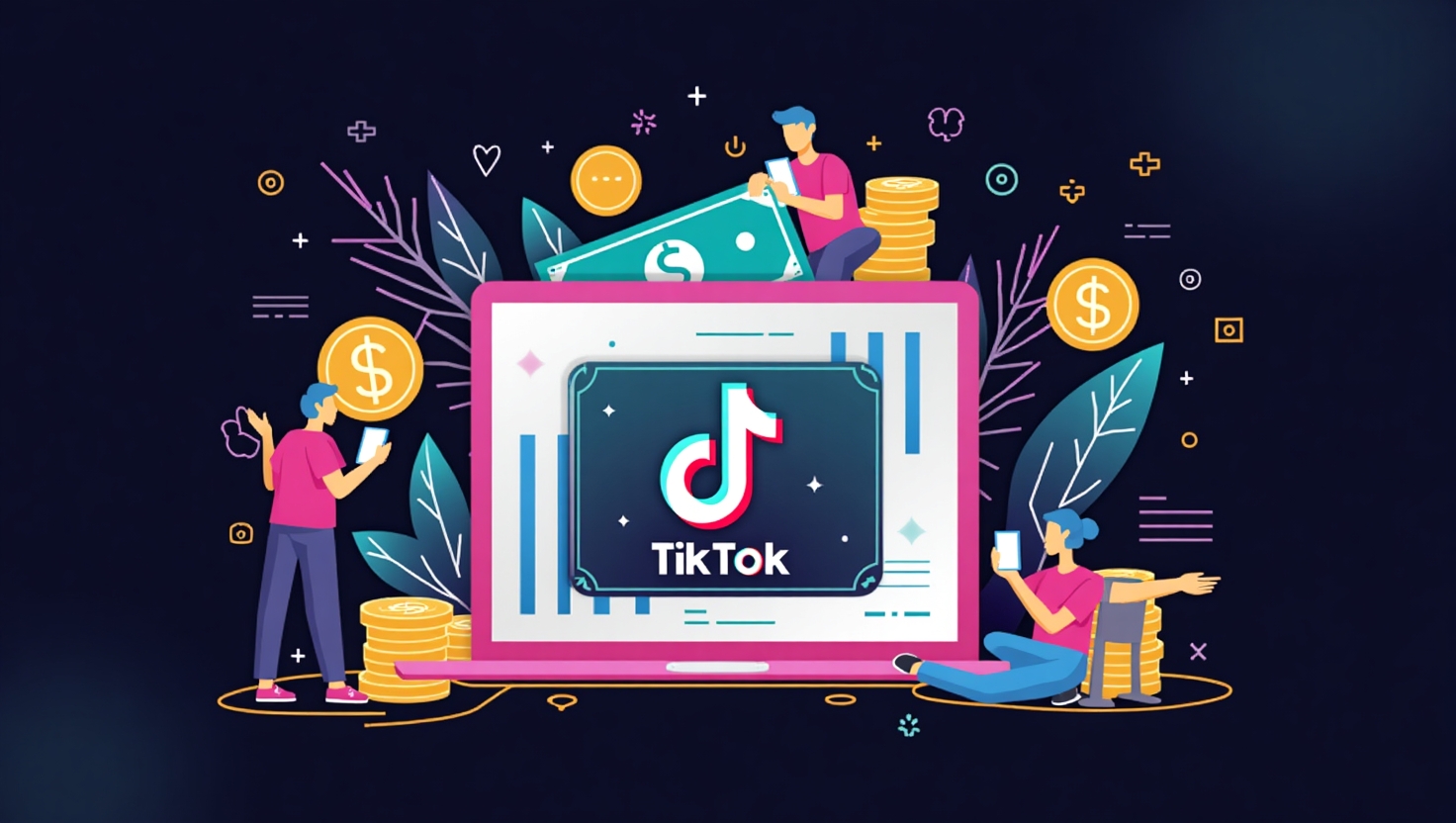
Have you ever thought about how a 60-second TikTok video could change a whole generation’s money habits? The tiktok effect is real, and it’s changing how Gen Z thinks about money, saving, and investing. With billions of views on financial content, social media is now more than just trends. It’s shaping gen z financial habits in ways we’re still learning about.
Key Takeaways
- The tiktok effect is reshaping how Gen Z interacts with financial information.
- Social media impact on financial decisions is significant and growing.
- Gen Z financial habits are increasingly influenced by viral content and trends.
- Understanding the tiktok effect is crucial for grasping modern financial literacy.
- The intersection of social media and finance is creating new opportunities and challenges.
Understanding the TikTok Effect on Financial Behavior
TikTok has become a place where people talk about money, changing how Gen Z handles finances. It’s not just about fun videos; it’s also about learning about money. Let’s dive into how this works and why it’s important.
The Rise of Financial Content on TikTok
TikTok is now full of money talks, from budgeting tips to investment advice. Creators use humor and stories to make money topics easy to understand. For example, the “FIRE movement” is inspiring young people to think differently about money.
- Short-term financial goals are often highlighted, appealing to Gen Z’s desire for quick wins.
- Investment trends like Robinhood’s rise show how platforms are democratizing access to the stock market.
- Budgeting challenges encourage users to share their money-saving strategies, fostering a sense of community.
These trends aren’t just fleeting—they show big changes in how we manage money.
How Gen Z Consumes Financial Information
Gen Z likes information in small doses, and TikTok gives it to them. Videos mix fun with learning, making money topics easier to grasp. For example, influencers simplify complex topics like investing or credit scores.
This generation also values what their peers say. Influencer marketing is key, as followers see influencers as real people who care about their financial health.
The Psychology Behind Social Media Financial Influence
Why does TikTok have such a big effect on money habits? It uses psychology. The platform keeps users hooked, making them watch more. This can change how they think about money.
Seeing others achieve financial goals can make us want to do the same. This fear of missing out can lead to quick, possibly not-so-smart money decisions.
As TikTok grows, so will its influence on money matters. Understanding this can help us better deal with the mix of online trends and money management.
“Link to a reputable financial literacy resource like Investopedia or NerdWallet, where readers can dive deeper into understanding budgeting, saving, and investing strategies. Example: ‘Learn more about building strong financial habits at Investopedia’s Financial Literacy Guide.'”
The Evolution of “FinTok” and Its Growing Impact

TikTok’s financial community, known as “FinTok,” has grown a lot. It’s changing how Gen Z talks about money. This change is because of how people use digital platforms to find and share financial info.
On FinTok, people post about money matters. They share tips on saving and investing. This new way of sharing info is changing the financial world. It’s making the industry adapt to what Gen Z wants.
Some key features of FinTok include:
- Community-driven discussions and advice
- Personal finance tips and strategies
- Investment trends and analysis
FinTok’s growing influence shows how social media affects money choices. Looking at FinTok content and user interactions helps us understand the future of money and investing.
How Social Media Warps Gen Z’s Financial Habits: The Digital Revolution
Gen Z’s financial habits are shaped by their online presence. Social media plays a big role in their financial decisions. They often look to social media for advice on managing their money.
The rise of online platforms has changed how Gen Z plans their finances. They often choose instant gratification over long-term planning. This is because they fear missing out on investment opportunities and want to keep up with trends. Financial literacy is key to navigating these platforms and making smart choices.
Key Factors Influencing Gen Z’s Financial Habits
- Instant gratification vs. long-term planning
- The role of FOMO in financial decisions
- Viral investment trends and their consequences
It’s important to understand these factors to see how social media affects Gen Z’s money habits. By knowing the impact of online platforms, Gen Z can make better choices for their financial future.
The Dark Side of Financial Advice on TikTok

TikTok has become a place for financial advice, but there are risks. The focus on getting likes can lead to spreading wrong information. This can cause people to make bad money choices.
Many people who don’t know much about money are giving advice on TikTok. They might talk about quick ways to make money or investing in things they don’t fully understand. This can be especially dangerous for young people who are just starting to learn about money.
The way TikTok works can also make bad advice spread fast. It favors content that gets a lot of attention, even if it’s not good advice. This can include using credit cards for investments or ignoring saving for the future. These ideas might sound good, but they’re not always safe or smart for managing money.
To stay safe from bad advice, here are some tips:
- Check if the person giving advice knows what they’re talking about.
- Look for advice from different places before making a decision.
- Be careful of anyone who promises you’ll make a lot of money quickly.
By being careful and thinking critically, you can use TikTok’s financial tips wisely. This way, you can stay safe and make smart money choices.
Gen Z’s Changing Relationship with Traditional Banking
Gen Z’s financial habits are changing because of digital platforms. This shift is making banks adapt to meet their needs. Social media also plays a big role, as many Gen Zers look online for financial advice.
Digital banking is becoming more popular. Gen Z likes it because it’s convenient and fast. Banks are now investing in digital services to stay relevant.
- Demand for mobile banking services
- Increased use of digital payment systems
- Growing interest in cryptocurrency and alternative investment choices
Gen Z’s financial habits are evolving. They want flexibility, convenience, and new tech. It’s exciting to see how banks will adapt to these changes.
Social Media’s Impact on Spending Patterns
Social media greatly affects gen z’s spending habits. Sites like TikTok and Instagram make users want to buy things right away. This can cause debt, stress, and lower savings.
Studies show that social media influencers really shape gen z’s buying choices. A survey found that 70% of gen z consumers are more likely to buy something if an influencer recommends it. This shows how big of a role social media plays in their spending.
Several things lead to spending because of social media:
- Peer pressure: Seeing what others buy on social media makes gen z feel like they’re missing out.
- Influencer marketing: Influencers promote products with catchy ads and words.
- Advertising: Social media ads are made just for gen z, using their data to target them.
Understanding how social media affects spending helps us see its big impact on gen z’s money habits. This knowledge can help us teach them to spend wisely and responsibly.
Financial Literacy vs. Social Media Influence
In today’s world, it’s easy to get caught up in what’s trending online. But when it comes to money, it’s key to focus on financial literacy. This means knowing the difference between real advice and just popular content.
It’s important to think critically in our digital age. This helps us make better financial choices and avoid mistakes. Financial literacy helps us understand and manage our money well, using online tools and advice.
Here are some ways to improve critical thinking:
- Check information with trusted sources
- Look at the credibility of online content
- Get advice from financial experts
By focusing on financial literacy and critical thinking, we can help people manage their money better. This includes being aware of how social media can affect our spending.
Ultimately, it’s up to each person to value financial literacy and make smart money choices. By doing this, they can confidently navigate the digital world and reach their financial goals.
The Future of Gen Z Financial Behavior in a Social Media-Driven World
Social media is shaping the financial habits of gen z. It’s key to think about their future money behavior. Digital platforms are a big part of their lives, affecting how they spend, invest, and learn about money.
The mix of social media, tech, and finance will keep changing. Gen z will lead this shift.
Some trends that might happen in gen z’s money habits include:
- More use of social media for learning about money
- More people using digital banking and mobile payments
- More focus on learning about money and making smart choices
Gen z will face the challenges and benefits of social media’s impact on money. They need to know how social media affects their money habits. This way, they can make better choices and develop good money habits for the future.
The future of gen z’s money habits will depend on balancing social media’s influence with smart money decisions. By knowing the good and bad sides of social media, they can use it to learn more about money. This will help them make better choices about their financial lives.
Conclusion: Balancing Social Media Influence with Sound Financial Decisions
The TikTok effect has deeply influenced Gen Z’s financial habits. It’s important to find a balance between social media’s impact and smart financial choices. The rise of financial content on TikTok has made information more accessible. Yet, it also brings risks like misinformation and quick investment trends.
It’s vital to think critically and be skeptical of financial advice on social media. Young people should learn to tell apart reliable advice from popular trends. This way, they can make choices that fit their long-term financial plans. Also, having a strong grasp of financial literacy helps them handle the digital world confidently.
Looking ahead, Gen Z’s relationship with money will keep changing. This will be influenced by the ongoing shift in social media and digital finance. By using technology wisely and sticking to solid financial rules, this generation can use social platforms to make better financial decisions. This will help them secure their financial future.
The TikTok Effect : FAQ
What is the TikTok effect and how does it influence Gen Z’s financial habits?
The TikTok effect is how TikTok shapes Gen Z’s money habits. It’s a big deal because TikTok is full of money tips and advice. This shapes how young people think about and handle money.
How has the rise of financial content on TikTok impacted the way Gen Z engages with personal finance?
TikTok’s financial content has made Gen Z more interested in money matters. They find tips on investing and budgeting on TikTok. It’s easy to follow and understand.
What psychological factors contribute to the TikTok effect’s influence on financial behavior?
The TikTok effect works on Gen Z’s mind in many ways. It’s about wanting things now, fearing missing out, and following trends. These can make young people act on money without thinking it through.
How has the “FinTok” community evolved, and what is its growing impact on financial discussions?
The “FinTok” community has grown a lot. It’s all about financial creators and talks on TikTok. This community is changing how Gen Z talks about and handles money.
What are the potential downsides of financial advice on TikTok, and how can users navigate this landscape?
TikTok’s money advice can be wrong or misleading. It’s important for Gen Z to be careful. They should check if the advice is true and seek real financial help when needed.
How is Gen Z’s relationship with traditional banking evolving due to the influence of social media?
Gen Z is moving away from old banking ways. They prefer digital banking and new investment options. Social media, like TikTok, is making them more interested in these changes.
How does social media impact the spending patterns and financial decisions of Gen Z?
Social media has a big effect on Gen Z’s spending and money choices. It can lead to more debt, stress, and less saving. This is because of the influence of influencers and ads.
How can Gen Z develop the necessary financial literacy and critical thinking skills to navigate the social media-driven financial landscape?
Gen Z needs to learn about money and think critically. They should know how to spot good advice and understand the value of what they see online. This will help them make smart money choices.








1 thought on “The TikTok Effect: How Social Media Warps Gen Z’s Financial Habits”